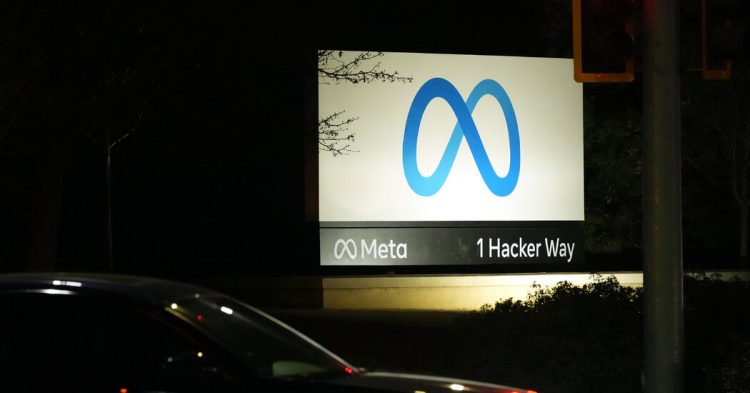SAN FRANCISCO — For years, Facebook’s sales grew without fail and kept on growing, defying the laws of gravity even as the company was battered by scandals over privacy and misinformation.
Not anymore.
On Wednesday, Meta, the company formerly known as Facebook, reported a 1 percent decline in quarterly revenue from the previous year. It was the first time the social media giant’s revenue had fallen since it went public a decade ago, as it confronts increased regulatory scrutiny and a turbulent economy while trying to build a new frontier of digital communication.
Meta’s revenue for the second quarter was $28.82 billion, down from $29.07 billion a year earlier. Profit was $6.69 billion, down 36 percent from a year earlier. Wall Street analysts had predicted profits of $7.04 billion on revenue of $28.9 billion, according to data compiled by FactSet.
The results compounded a difficult day for Meta, which was also sued on Wednesday by the Federal Trade Commission over a deal to buy a virtual reality company called Within. The lawsuit struck directly at the ambitions of Mark Zuckerberg, Meta’s founder and chief executive, who has been spending billions of dollars to create an immersive world of social interaction in the “metaverse,” which is a combination of virtual and augmented realities that will be bound by commerce and online relationships.
Meta’s declining revenue was especially stark given that as recently as 2019, its quarterly revenue growth was 28 percent. The company attributed its most recent lackluster financial results to weaker demand for digital advertising and the broader economic uncertainty.
Read More on Facebook and Meta
“We seem to have entered an economic downturn that will have a broad impact on the digital advertising business,” Mr. Zuckerberg said in an earnings call. “The situation seems worse than it did a quarter ago.”
Google, Twitter and Snap, which rely on online advertising, have also said this month that they experienced reduced demand for advertising because of the slowing global economy. Some of the companies cited the effects of the war in Ukraine and its destabilizing effect on the European ad market, as well as the strength of the U.S. dollar, which has hurt companies when it comes to global sales.
That pain is unlikely to end soon. For the current quarter, Meta said it expected “a continuation of the weak advertising demand environment.” E-commerce ads were waning as “peak pandemic” had passed and more people ventured outside, the company said, adding that tough periods like these were “cyclical” historically.
Mr. Zuckerberg, who has been reining in spending and trimming perks at his company, said he expected to “get more done with fewer resources.” But he noted that he planned to continue investing in key areas that would set Meta up for its next phase of growth.
Beyond the economic tumult, Meta faces its own particular set of challenges. Last year, Apple made privacy-related changes that hampered Meta’s ability to measure and deliver its advertising on Apple-made mobile devices. (Meta makes the vast majority of its advertising revenue from smartphones.)
It is also staring down the barrel of one of its toughest competitors in TikTok, the Chinese-owned video app that has captured the attention of more than one billion people in just a few years. Mr. Zuckerberg has begun to shift his company’s products to mimic TikTok’s offerings, including making sweeping changes to Instagram and Facebook.
At the same time, Mr. Zuckerberg has been spending big on his vision for the metaverse. He has told investors, technologists and others that the effort may take years to come to fruition and that the endeavor will be costly. Some investors are skeptical that the investments will pay off in the long term.
Still, there were bright spots in Meta’s earnings report. The company said its “daily active people,” its term to describe users across its family of apps — which includes Facebook, Instagram and WhatsApp — increased to 2.88 billion, up 4 percent from a year ago. That exceeded analysts’ expectations that the company was losing visitors. The Facebook app also saw user growth within the United States, an area that some believed was saturated.
Mr. Zuckerberg said he was encouraged by other areas of Meta’s business that are driving growth and engagement, like the Reels video product, a feature within Instagram that is similar to TikTok’s video offering. Investments in artificial intelligence recommendation algorithms have also driven more people to use the service and for longer periods, the company said.
His goal, he said, was to eventually make more money from Reels, which is not as lucrative for Instagram as the app’s other advertising formats. Part of the challenge was to push through a “cannibalization” effect, where more people use the new Reels product and shift away from viewing more valuable ads displayed in between the photos and stories portions of the app. Mr. Zuckerberg said he believed it was only a matter of time before Meta figured out how to better make money from Reels.
To make it through a difficult period, the company said it planned to slow hiring in the second half of the year and cut costs. On Tuesday, Meta’s Reality Labs hardware division, which makes virtual reality headsets and other products, said it would increase the price of its marquee V.R. headset, the Quest 2, by $100.
Meta also said that David Wehner, the chief financial officer, would become chief strategy officer, a new position that also oversees corporate development. Susan Li, who serves as vice president of finance at Meta, will become chief financial officer.
In a post to his Facebook page, Mr. Zuckerberg said the change in Mr. Wehner’s role would help with challenges, partnerships and internal organization. “These areas will benefit from a more disciplined strategy process,” he said.
Sheryl Sandberg, Meta’s chief operating officer, also appeared on Wednesdays company earnings call, the last of her 14-year tenure. Ms. Sandberg, who plans to depart the company in the fall, struck an upbeat tone while acknowledging the challenges Meta faces.
“There is no doubt that we are going through a transition period, and doing so in a time of global economic uncertainty,” she said. “Meta is a company that has shown extraordinary resilience. And we have demonstrated time and time again that when we build products, they scale globally.”
Source by www.nytimes.com






























